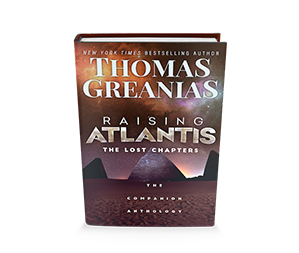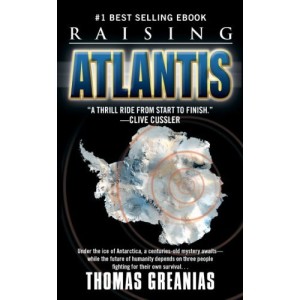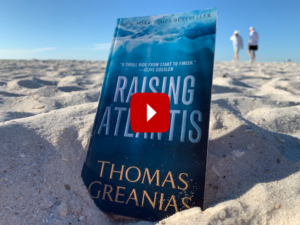
Headlines from Antarctica heralding the discovery of a parallel universe going backwards in time have prompted New York Times bestselling author Thomas Greanias to release the legendary “lost chapters” of his original Raising Atlantis eBook after 20 years on July 21, 2020.
Long before it became a New York Times bestseller, Raising Atlantis was a No. 1 bestselling eBook in PDF format on Amazon—years before Kindle’s invention.
“Those were ancient days for the Internet and Amazon at the turn of the millennium,” remembers author Thomas Greanias. “Most copies of Raising Atlantis were downloaded and read on desktop computers, and most of those were inside the military and intelligence communities.”
As a result, U.S. officials flagged the novel and its fictional premise about the ruins of Atlantis beneath Antarctica over national security concerns. By the time the novel was published in print by Simon & Schuster in 2005, entire chapters were redacted and the storyline altered. The ever-popular adventure remains unchanged in all subsequent editions, including the 15th anniversary paperback released in 2020 before the global pandemic.
“Many of the concerns involved arcane details about troop movements and time-to-theater minutia that would seem pedestrian to you and me,” Greanias said. “It was the ‘anomaly’ I described that caused the most alarm. Now that the so-called news is out about parallel universes and time travel at the bottom of the world, I’m free to release these redacted chapters—as fiction.”

Original 2005 Paperback
The latest news cycle got started in January 2020 with a NASA research paper published by Cornell University. The paper detailed research on rare cosmic ray neutrino particles detected by the Antarctic Impulsive Transient Antenna (ANITA). Neutrinos typically come from space and pass through solid objects. But ANITA detected neutrinos coming from the earth’s interior instead.
Now what could that possibly mean? Only an astrophysicist can really say, but it hasn’t stopped the media from turning an actual scientific event into fantastic clickbait.
“We may have spotted a parallel universe going backwards in time,” heralded New Science in its April headline. “Strange particles observed by an experiment in Antarctica could be evidence of an alternative reality where everything is upside down.”
The news went viral from there, from serious articles debunking the idea to staunch defenses of the science, and many jokes and memes in between.
“Parallel universe breakthrough: Scientists ‘find origins’ of anomalies in Antarctica,” chimed the UK’s Express. Meanwhile, a USA Today fact check article acknowledged genuine mystery surrounds the anomalies: “Some of the high-energy neutrinos seem to come from out of the Antarctic ice, though, which would be an incredibly unlikely phenomenon.”
The only consensus for now is that whatever is “down there” is literally the tip of the iceberg. More research is needed—and guaranteed—in the years ahead.
“All I can say about the subject is in my new anthology Raising Atlantis: The Lost Chapters,” Greanias said. “I’m happy to finally put it out there, for fun, and hope it won’t be taken too seriously or pulled down again.”




